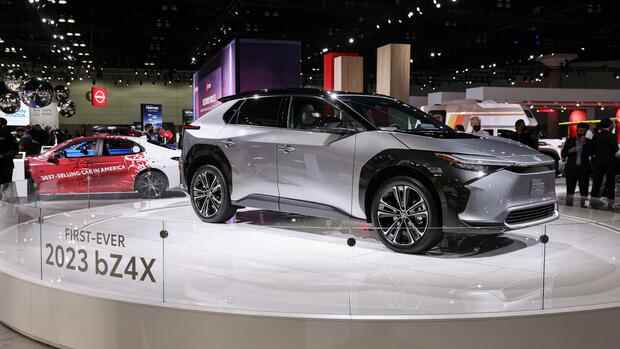Tokyo The world market leader has a problem: While Toyota does not give the competition a chance in sales even in Corona times, the group has so far lacked competitive electric cars. The hydrogen-powered Mirai may be brand new but only a niche offering. And Toyota doesn’t have battery-powered electric cars to offer. The pure electric car bZ4X is not planned for 2022.
Time for CEO Akio Toyoda to convince the world with a promise that Toyota will not give up the growth segment without a fight: They want to build “electric cars for everyone”, the CEO promised on Tuesday in Tokyo and at the same time announced that they would massively expand investments.
The Japanese therefore want to invest four trillion yen (the equivalent of around 31 billion euros) in new electric cars by 2030. By 2030, 30 battery electric models (BEV) from Toyota are to come onto the market, so far the group had planned with 15 electric models by 2025. In the future, Toyota wants to sell around 3.5 million electric cars per year in 2030, previously the group had calculated with two million electric cars. The premium brand Lexus is to become a pure electric brand.
This is a turning point for the group, which has so far mainly relied on hybrid and hydrogen drives.
Top jobs of the day
Find the best jobs now and
be notified by email.
The Japanese auto giant announced that battery production is expected to rise to a whopping 280 gigawatt hours by the end of the decade. By 2030, the Toyota Tsusho trading company had secured the raw materials required for this, said Toyota chief technologist Masahiko Maeda.
For the electric offensive, the world market leader is relying above all on the experience gained from hybrid production and hopes to catch up with the hasty competition from Volkswagen and Tesla with superior battery technology. When it comes to drive, motor control and batteries, the semi-electric hybrid models have provided decades of experience, emphasized CEO Toyoda.
Ten year guarantee on the battery
A new compact crossover for Europe is supposed to prove that: With a consumption of 12.5 kilowatt hours per 100 kilometers, the upcoming Stromer will offer the brand “the highest efficiency in its class”, promised Toyota’s CEO. In ten years the battery will only lose ten percent of its capacity. That is better than the industry average and increases the resale value.
In addition to high efficiency, Toyota also relies on cost advantages due to the sheer volume of the group. The Japanese and their partner manufacturers Suzuki, Subaru and Mazda currently sell around 16 million cars a year and have a global network of plants.
At the same time, in several development partnerships, the partners not only share the costs of developing electric vehicles, but also components or entire platforms. Toyota developed its bZ4X together with partner Subaru, who will also be launching the model under the name Solterra next year.
The small car specialist Suzuki, in turn, which is particularly well positioned in the Indian market, will also use parts and technologies from Toyota in its electric car offensive. Suzuki plans to introduce four-seater electric minis for 2025, the retail price of which could be less than 10,000 euros.
Further investments in hydrogen and hybrid
In the future, Toyota wants to outpace the competition with a completely new battery technology. So-called solid-state batteries are intended to increase not only the safety, but also the range of Toyota’s electric vehicles. Toyota recently presented a prototype at the Olympic Games in Tokyo. In the middle of the decade one would like to slowly venture towards market readiness.
In addition to the electric car, Toyota wants to continue investing in hydrogen and hybrid cars. The Japanese have budgeted four trillion yen (around 31 billion euros) for this as well. While the big competitor Volkswagen, under CEO Herbert Diess, is concentrating fully on battery-electric drives and investing 52 billion euros more in new electric models and technology, Akio Toyoda is pursuing a two-pronged strategy.
In management theory, it is perhaps more efficient to concentrate, emphasized the Toyota boss. “But we believe that in an uncertain situation it is better to leave options and react flexibly to demand.” Ultimately, it is not the CEOs who decide, but the customers, argues Toyoda.
More: Start with electric cars – Toyota is following in the footsteps of Volkswagen
